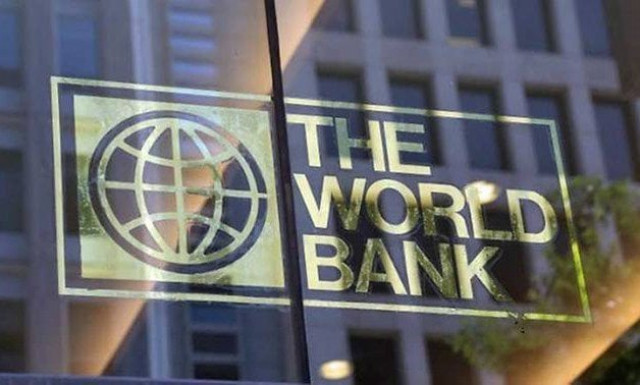Murad discusses water projects of over $1b with World Bank
CM says govt has given equal attention to development of rural, urban areas

The logo of the World Bank. PHOTO: AFP
The delegation, which included WB South Asia regional director Johan Roome, programme leader Lixin Gu and senior financial sector specialist Namoos Zaheer, met Shah at the CM House on Friday, discussing the provincial government's development priorities as well as the WB's ongoing and future projects.
"Urban areas need drinking water and water for industrial requirements, while the rural areas are in need of efficient agricultural water systems for the growth of the agro-sector," explained the CM, bringing up water development projects in the province.
He told the delegation that the Karachi Water and Sewerage Services Improvement Project, assisted by the World Bank, was aimed at improving access to safe water in the city, as well as to boost the Karachi Water and Sewerage Board's (KWSB) financial and operational performance.
The project will cost $100 million, of which $40 million are to be provided by the International Bank for Reconstruction and Development (IBRD), $40 million by the Asian Infrastructure Investment Bank (AIIB) and $20 million by the Sindh government. The loan agreement was signed in December 2019.
Shah informed the WB officials that the project would include utility reforms and rehabilitation of the provincial capital's water and sewerage network. Briefing them about the progress to date, he said that the KWSB had been reconstituted, a steering committee had been formed, the project director appointed and a procurement document of $6 million approved by the bank.
They also discussed the second Karachi Water and Sewerage Services Improvement project of $6 million, of which $240 million would be given by the IBRD, $240 million by the AIIB and $120 million by the Sindh government. This project, according to the CM, includes the augmentation of the K-IV water project, bulk supply options and the installation of new filtration plants.
The planning and development chairperson, Muhammad Waseem, said that the CM had approved the investment plan but is yet to share it with the World Bank.
Improving irrigation
Meanwhile, Shah and the delegation also discussed the Sindh Water Sector Improvement Project (SWIP), which aims to improve the efficiency and effectiveness of irrigation in the Ghotki, Nara and Left Bank canals. The project, costing $257.6 million, also includes asset management and future planning components.
Shah further said that feasibility studies were being conducted for the rehabilitation and modernisation of the Guddu Barrage. "Institutional reforms will be made, focusing on the devolution of managerial responsibilities to farmers through the Sindh Irrigation and Drainage Authority, area water boards and farmers organisations," he disclosed.
"The impact of the project will be improved water equity and reliability for 1.8 million hectares of agricultural land and over 100 towns and villages, benefiting more than five million people," he claimed.
The project also aims to make water available up to the tail end of Ghotki, Tharparkar and Badin districts.
Mobility in the city
The World Bank representatives also discussed urban transport plans with the CM, with the 21-kilometre Yellow Line bus rapid transit (BRT) corridor to be developed with the bank's assistance under the Karachi Mobility Project.
Shah said that the World Bank had approved a loan of $382 million for the BRT project, going from Dawood Chowrangi to Numaish, in June 2019, with the loan agreement being signed in November 2019.
Giving updates, Waseem said that the project director would soon be appointed, while the Sindh government was in the process of appointing six procurement specialists. Sindh finance secretary Hassan Naqvi pointed out that the provincial government had trained 550 Grade-17 procurement officers, of whom six would be appointed for this project.



















COMMENTS
Comments are moderated and generally will be posted if they are on-topic and not abusive.
For more information, please see our Comments FAQ